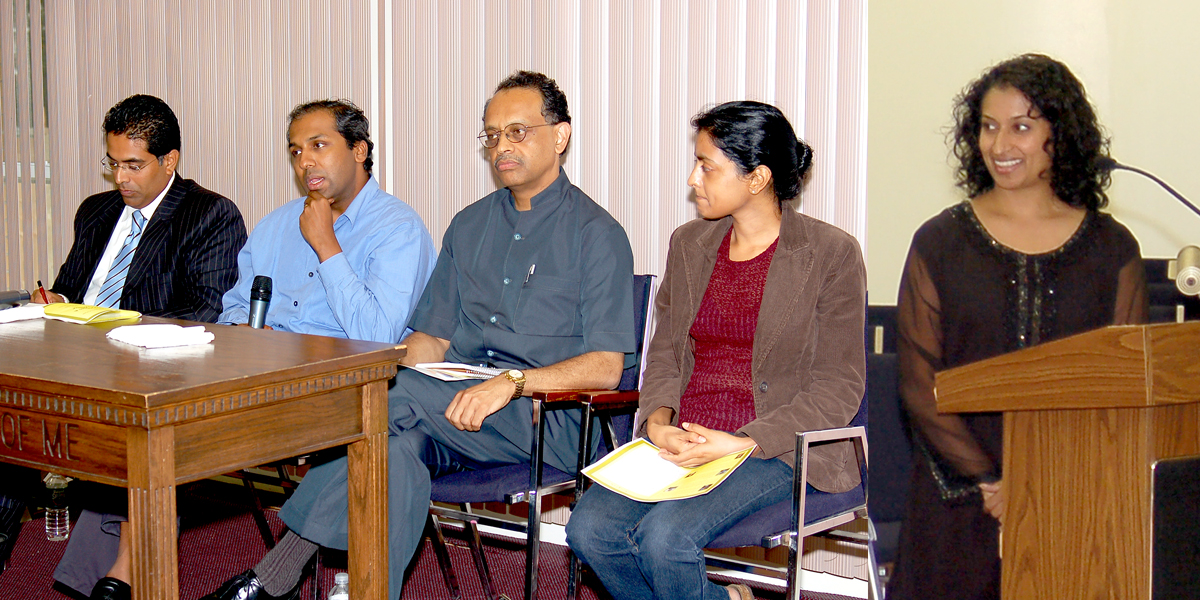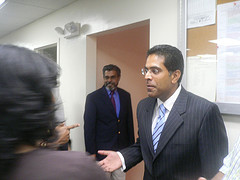I attended a seminar organized by the Kerala Pentecostal Writers Forum called "Malayalees and the Media" Sunday evening 9/24/06. There were four writers on the panel, who have been repping Mallu pride with extreme class, and it was a pleasure to hear from all of them.
I'm just going straightforward and leave you the questions and the panelists' answers. But first, the introductions.
The four panelists were...
![]()

photo credits by Balu Menon
George Rajan Thomas - Reporter for CBN News (and there is absolutely very little information online about him. If you want to see him, you can search for George Thomas on CBN News)
Sree Sreenivasan - Professor of Journalism @ Columbia
George Abraham - Founder of Kerala Digest, a malayalam newspaper in North America.
Sarita James - Freelance writer exploring the art of the personal essay.
On to the questions. The following questions were thrown out by the moderator, Sybil. I've tried to be as accurate as possible, but there's some probability that I have attributed a few comments to the wrong panelist. And whenever I've felt like it, I've just given the gist of their thoughts.
Q. Give us a little background on how you approached journalism.
Sarita: Well, I'm not really a journalist, I'm more of a freelance writer. I used to write for the Harvard South Asian Journal, do guest editorials for the Harvard Crimson and got experience writing like that. After getting my personal essay published in the NY Times, I have been approached by several literary agents and am currently in discussions with publishers on a book.
George Abraham: When I first came to the U.S. in the 60s, I had to choose between what I wanted to do and what I had to do. I wanted to write but I ended up studying computer science. We first published a newsletter called "Chalana" and then "Tharavad". We had the inspiration to publish a newspaper, so we started a handwritten "Keralam Sandesham" and then started Kerala Digest which ran for three years. "Nadham", "Prabhatham" and other publications came after that.
Sree: My parents didn't want me to be a journalist. In fact, my grandfather used to ask why I wanted to be a journalist. In his words, "Why would you want to be the guy running around asking for interviews when you can be somebody who gives interviews." He was finally happy to know I had an M.S. in journalism and he would tell all his friends that I worked in computers, which of course I did, being a journalist.
George Thomas: I grew up in Tanzania and East Africa and the country was under the control of a dictator. The only way to get any access to news was to listen to the radio or go to an embassy. My dad would make me go to the American Embassy every day and watch the news. He would then make me summarize it when I got back home.
Q. What are we talking about when you say media? What opportunities are available for those interested in the field?
Sree: The journalism industry has lost 80,000 jobs since 2000. Columbia has a M.S. in Journalism, and there are other undergrad programs that you can apply to for journalism. You might want to think about non traditional methods however like blogs. The most important thing is having something to say.
George Thomas: documentary filmmaking
Sarita James: I've often found that its easier to approach local papers that have ties to your community. I submitted my first article to Urban Indian. George Abraham: In addition to blogs, you should consider ethnic journalism.
Q. Why is it important for our community to be in the media?
Sree: We have to get involved. It makes a difference if you write letters to the editors. The story about "Flying while Brown" after 9/11 did not break until Ashraf Khan took a stand when he was kicked off a plane. We have power as consumers of the news.
George Abraham: The image of Indians in the media is slowly changing. We have been improving the image but there is an inconsistency between the way we view prejudice here and in India.
George Thomas: We've always had an image as a Non Aligned Nation. I noticed when I was in India covering the Bush visit that Indians had so much pride in what they were doing as a country. We tend to be quiet, both about the good and the bad, but people are realizing that we are an important part of the world.
Sarita James: We need to get involved in our local communities and in the political process.
Audience questions
Q. (Mathai Alumootil to George Thomas): Did you have the vision to be a journalist when you were young?
No. I hated my dad for forcing me to do it. I love him for it now. Before 9/11I was submerged in an islamic group for a year, and I found out later that the group had direct ties to the 9/11 bombers. It has come upon me as a burden to report on these hotspots around the world where there is no peace.
Q. What concrete steps would you recommend for people who are looking to break into journalism?
Sree: Get in touch with us. Use the SAJA discussion board. There are numerous scholarships available that we are often unaware of. Get in touch with ethnic journalists. They are on the front lines of the news.
Q. How has your personal faith influenced your journalism?
George Thomas: Tremendously. I don't leave my faith at the door. Its who I am. I have to report both sides of the story. The goal is not to show my bias but to show both sides and allow the users to make up their own minds.
Sree: I'm not a christian, but I have been brought up with a strong sense of the Malayalee culture, and I've worked at helping correct errors about the indian culture. I am proud of my culture.
George Abraham: I have grown up in Kerala, noted for its communal harmony and I strive to see that played out wherever I am. Social justice, baby.
Q. How much interest is there for ethnic media?
Sarita: Lots. Mainstream is beginning to mean immigrants.
And that was about all the notes I managed to take. I gave up on writing it all down when I found out they were running out of time. I had so many questions to ask too. I don't think I've added in any opinions of my own so far, so I'll take this last bit of space for some venting. It was good. Real good. End of personal opinion.
I'll throw in all the questions I prepared along with dippu staff as an added bonus. Maybe, if some of the panelists read this article, they'll address some of the questions that weren't raised. Or you could leave your opinions and answers. Feel free to add your own questions to the discussion.
Q1. As Malayalees, are we using the internet to integrate into world culture or are we creating a virtual ghetto?
Q2. Are there more opportunities for malayalees/indians in general in the media? (answered with a resounding yes. GT says that CBN is making more of an effort to bring diversity to their newsroom. Sree mentioned the increasing visibility of Indians on network television. )
Q3. Do you find it hard to practice your faith and be part of the media...(Answered above. )
Q4. Do you have to look good to get on TV? (This question was sent in by Laney, who wanted to know if there was ever any pressure to get plastic surgery in order to get a little more telegenic for the camera.)
Q5. Do you have to hide aspects of your malayalee culture?(Answered above in the faith question)
Q6. How do you express your malayaliness through your writing?
Do you try to let the rhythms of malayalam affect your writing in English. (I asked Sarita about this, and she said that she knew malayalam as a little child but forgot it as she grew older. which is its own answer. )
Q7. What kind of writing are you seeing now, done by other malayalees?
Q8. In your writing/media experience, do you ever find yourself explaining to people about being malayalee. or do you ignore that?
Q9. How integral is being a malayalee to your writing?
Q10. Do you feel that there aren't enough indian women doing journalism?
Q11. As writers do you find it unsettling in any way that the majority of the writing done by malayalee pentecostals tends to be expositions or short homilies? (this one is probably for George Thomas or George Abraham since the other two panelists aren't mallu pente.)
Response from George Abraham
A6a. These days, I rarely try to highlight my Malayaleeness in the areas where I am involved in. Since I am busy with social justice issues covering the entire India, I try refrain from emphasizing regional differences. However, if I am invited to an Onam festival and asked to say something, I would do so extolling the uniqueness and virtues that we are proud of.
A6b. I still do to an extend. I try to get out that mode and have the thinking process directly translated into what I want to express. I grew up in Kerala till 18 and old habits die hard.
A11. I feel that Pentecostals generally are inward looking and make little effort dealing with issues extraneous to their immediate interest. We are a little self-righteous and judgmental that our activities tend to be more parochial. That indeed reflects in their writings in media (Pentecostal) that seems to be dedicated to exhort each other. That is why I am grateful to Leema for stepping outside the box and conducting that media seminar the other day.
South Asian Connection credit their gratitude to Thomson Valliyakalayil for this interview. For the full article, please visit Dippu.com
Leave a Comment: